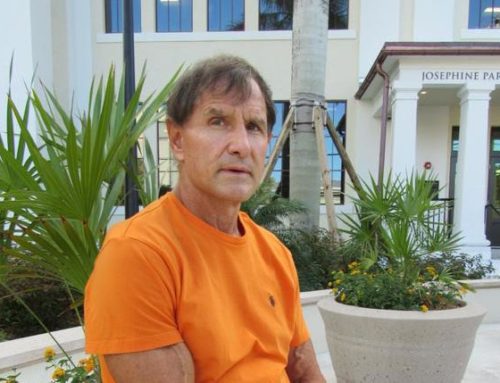Kirkus Review
Dan “Tito” Davis grew up in a family of seven in South Dakota. After years of dealing drugs; time spent in prison; two marriages and a whole lot of living in between Tito was set up on false drug charges by a long time friend. Faced with 30 years in prison for a crime he did not commit Davis went on the run for 13 years avoiding federal law enforcement across multiple countries and continents. Black-bagged in 2007 while living in Venezuela (extradited without an agreement with the country) Tito served 105 months in prison. He was released in 2015 and now lives in Key West, Florida where he is part of the local writer’s guild and enjoys fishing, playing pickleball and bicycling around town. GRINGO is his first book.
Portland Book Review
From South Dakota to Venezuela, Gringo: My Life on the Edge as an International Fugitive is a fast paced, roller coaster adventure that will leave readers completely hooked, and completely exhausted trying to keep up. Davis struggles with acquiring false paperwork, encounters kidnappers, smugglers, assassins, scam artists, and prostitutes; some become his network of friends and support while he falls victim to others. Despite these harsh labels, Davis also manages to humanize the people he encounters by describing their families, their day jobs, and illustrating often how they are making the best of the situation life has thrown them.
This certainly isn’t a book for everyone; people with weak stomachs, have a hard stance against prostitution (legalized or not), or who are not willing or able to look at different cultures without judging them by American standards will probably have a hard time with this book. The writing style isn’t the most elegant, but it is gripping and will keep readers invested despite the few unnecessary repetitions and occasional typo. While the focus of the book is on the time spent as an international fugitive, it does end rather abruptly, and readers could possibly feel a bit unsatisfied receiving little to no information about Davis’s life post incarceration.
This book is a unique look at the inside of lives lived skirting the edges of society, of illegal or barely legal business ventures, and how one decision can completely send someone’s life into a different direction. It also serves as a different point of view into the War on Drugs pushed by the United States and how it affects people, and how dramatically laws have changed from the 60s and 70s to now. Whether or not you sympathize with Davis and the people he met over his life, Gringo: My Life on the Edge as an International Fugitive is a hard one to put down.
San Francisco
Star Rating: 5 / 5
We’ve all heard it said that truth is stranger than fiction. I can’t say this is always true, having read some very strange pieces of unconventional fiction, but I can say that truth is sometimes just as wild and exciting as fiction, and Gringo is the perfect example of that.
Dan Davis, also called Tito, has lived an extraordinary life, and I am lucky enough that a man with the skills of Peter Conti was willing to help him tell his story. The book opens with what I consider the literary variant of a television teaser: a prologue which shows where the author’s life will go, featured just before a first chapter, which goes back to the author’s childhood. While at times this may seem like a cheap trick, when used effectively, it can stir excitement and maintain the reader’s interest. This prologue falls into the latter camp, and all through the first few chapters, I found myself wondering just what would lead Tito to flee to Central America and where his life would go from there.
That’s not to say that I skimmed through those chapters, looking eagerly for the time when the action would pick up. While I was eager to reach the part of his life which would feature his flight from the law, those early chapters were far from wasted. They gave me insight into Tito’s personality, allowing me to understand who he is and how he reached the part of his life that would form the endpoint of the book.
The story begins with Tito – still merely Dan Davis then – as a young Midwestern man, looking for some way to make money. He settles on selling drugs, and from a little ambition, a little know-how, and some good luck in knowing the right people, he finds himself with a nascent drug empire on his hands. This part of the book alone could make a compelling tale, but the story continues from there. Betrayed by someone he thought he could trust, Davis finds himself hunted by the government, and he abandons his family to flee the country, making his way to Central America. Once there, he does not merely lie low but sets about building a life for himself.
Tito has lived a fascinating life, one well worth reading about, and I was enthralled by every page. Tito’s ambition and know-how lead him far past his humble Midwestern beginnings, and his rise and fall made a tale well worth reading, one which I would recommend to anyone.
Reviewed by Jo Niederhoff
Manhattan
Star Rating: 4 / 5
Born in South Dakota, Dan “Tito” Davis, along with co-writer Peter Conti, initially attempts to portray himself as an average kid. “Looking back at it,” he tells the reader, “I’m not proud of my behavior, but I wasn’t the first, nor will I be the last, twenty-year-old who got some help from his parents to start a business.” The difference, however, is that Tito’s just borrowed ten thousand dollars to expand his drug business so that he can continue supplying large quantities of White Crosses, first to his buyers in South Dakota, then later across much of the Southwest when he goes off to college at UNLV. After moving on from White Crosses, now involved with meth, he’s set up, and, rather than stick around and insist on his innocence, he flees to Mexico, leaving behind a wife and child.
The story of Tito’s life works best when he’s on the move, both because the peripheral details of his escape enliven the story and because it forces Tito to reflect on what he’s lost. Luckily, he never rests for long. In San Cristobal, Mexico, he meets Carlos, a fellow American on the run whose stories, Tito complains, “made absolutely no sense.” Tito wonders if this was because Carlos “had made up so many lies trying to reinvent himself along his journey that he no longer seemed like a real person.” Tito worries he’ll turn out the same way. There’s an acute sense here that Tito may lose himself long before he ever loses the feds and that losing himself won’t help him escape. This is driven home while on vacation in Cancun with his Venezuelan love, Mary Luz, who knows nothing about his fugitive status: “This begged the question: was I really the man she’d fallen for? How could I possibly be, when that man would never do such a thing to her?”
And while Tito’s jam-packed life is always fascinating, at times it actually acts as the book’s Achilles heel. Eager as Mr. Conti and Tito are to recount his entire life on the lam, they occasionally get ahead of themselves, teasing future events before promising to revisit them later in more detail. This approach backfires in perhaps the book’s tensest section, when Tito, still evading U.S. authorities, boards a plane to Germany with a layover in Miami in order to win back Mary Luz, abroad at university. His passage through customs is treated as fraught with potential detection and arrest, as it must have been at the time, but if readers aren’t on the edge of their seat, it’s because we were told a few chapters prior that Tito and Mary Luz eventually marry. As they churn through Tito’s life, the co-authors do touch on a wide range of bigger-picture topics, from rates of recidivism to prostitution, although they don’t always fully flesh them out. Oddly, though, this comes as a relief, because they don’t distract too much from Tito himself. Relentless and riveting, neither Tito nor the book ever stop to catch their breath.
Reviewed by Owen Hamill
Seattle Book Review
Star Rating: 4.5 / 5
Gringo: My Life on the Edge is a true, larger than life adventure of a fugitive on the run. Dan “Tito” Davis’ life begins in rural South Dakota with a very normal childhood, doing what kids of his age would do – playing, hunting, fishing, and helping out his family. Well, everything changes for him when he leaves home in 1974 to join the University of Nevada-Las Vegas, where he creates a multimillion-dollar business manufacturing and selling drugs. After being caught and serving a sentence of five years, Dan goes back to smuggling drugs and is eventually set up by his friend resulting into a life-sentence. This is where Gringo really begins, catches pace.
This book is more engaging than many memoirs I have come across. It takes you inside the American drug circuit and you remain overwhelmed at the events that unfold. The book follows Dan through different geographies of Mexico, Colombia, Guatemala, Costa Rica, Mumbai giving glimpses into their cultures. His life is nothing short of an action-packed movie; there is everything from money, airplanes, women, to gambling, revenge, kidnapping, bureaucrats, and more. And the idea of such a life lived by Dan is completely unfathomable, exciting, and heartbreaking at the same time. You will find yourself sympathizing with Dan as you engage deeper into his life’s happiness and disappointments.
Peter Conti is a great story-teller, and he has done a brilliant job with giving shape to Dan Davis’ story. His writing is crisp and packed with action – nothing fancy or distracting. Every sentence in the book transfers an electrifying energy into reader’s minds, taking them on a wild ride through the drug trafficking world. Gringo could have been even more enjoyable with pictures from the places where Dan spent his time and a little lesser hasty ending. I am curious to know more about his life after captivity. Gringo is an unbelievable story, more dramatic than a fiction could be! This book is a page-turner that should not be missed.
Reviewed by Meghna Hulsure





Leave A Comment